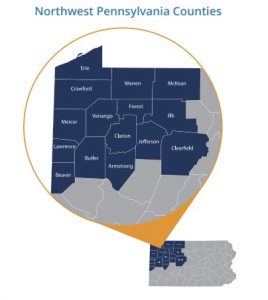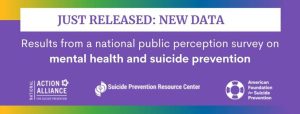 The Northwest Pennsylvania (NW PA) Veteran Suicide Prevention Program operates on a three-pronged approach involving healthcare providers, community organizations, and Veterans and their families in the 15 counties of NW PA. Because of this focus, we’d like to share the findings of the 2022 Public Perceptions of Mental Health and Suicide Prevention survey. We encourage everyone to review this information, share within personal and professional networks, and get involved in stigma-reduction and suicide prevention efforts in their communities.
The Northwest Pennsylvania (NW PA) Veteran Suicide Prevention Program operates on a three-pronged approach involving healthcare providers, community organizations, and Veterans and their families in the 15 counties of NW PA. Because of this focus, we’d like to share the findings of the 2022 Public Perceptions of Mental Health and Suicide Prevention survey. We encourage everyone to review this information, share within personal and professional networks, and get involved in stigma-reduction and suicide prevention efforts in their communities.
In addition to this baseline public perception polling, the Action Alliance, Suicide Prevention Resource Center (SPRC), and Substance Abuse and Mental Health Services Administration (SAMHSA) are currently working with the Ad Council Research Institute to conduct baseline 988 and crisis support formative research to better understand the attitudes, beliefs, perceptions, barriers, and motivators related to 988 and crisis supports among six populations at higher risk for suicide. Findings from this separate 988 formative research project should be publicly available in spring 2023.
Read time: 5 minutes
New National Public Perception Survey Data
 A new 2022 public perception national survey of over 2,000 U.S. adults helps us better understand the public’s beliefs and attitudes about mental health and suicide. The survey finds that while a majority of participants (96%) would take action to help if someone close to them was thinking about suicide, nearly two out of three believe they don’t have enough knowledge to talk about suicide with someone who may be struggling. This shows the importance of equipping the public with resources and tools to have these conversations and take action. The survey also provides timely findings on the public’s use of, expectations about, and barriers to using crisis services, such as the new 988 Suicide & Crisis Lifeline.
A new 2022 public perception national survey of over 2,000 U.S. adults helps us better understand the public’s beliefs and attitudes about mental health and suicide. The survey finds that while a majority of participants (96%) would take action to help if someone close to them was thinking about suicide, nearly two out of three believe they don’t have enough knowledge to talk about suicide with someone who may be struggling. This shows the importance of equipping the public with resources and tools to have these conversations and take action. The survey also provides timely findings on the public’s use of, expectations about, and barriers to using crisis services, such as the new 988 Suicide & Crisis Lifeline.
The survey, conducted by The Harris Poll on behalf of SPRC, the American Foundation for Suicide Prevention (AFSP), and the National Action Alliance for Suicide Prevention (Action Alliance), builds on past surveys from 2015, 2018, and 2020.
The 2022 data also show that, while gains have been made in the public’s perception of mental health and suicide prevention, there are still gaps that need to be addressed. The findings indicate U.S. adults have a strong desire to help but are uncertain about the best ways to do so, and they see access to care as the leading barrier to getting help. Key findings include:
- 94% of U.S. adults see suicide as a preventable public health issue.
- 92% of U.S. adults perceive mental health as equal to, or more important than, physical health. However, 51% feel physical health is treated as more important than mental health.
- 53% of U.S. adults feel that seeing a mental health professional is a sign of strength. However, around one-quarter to one-third continue to think it’s something most people cannot afford (32%), don’t know where to find (32%), or is inaccessible to most people (24%).
- More than half of respondents (57%) had heard of 988 and 81% report being likely to reach out to 988 if they or someone they know needed help.
Learn more about the 2022 data—along with related data from previous years—and learn how you can take action to strengthen mental health and suicide prevention.
Ready to become part of the solution and learn how to talk about suicide and mental health? Register now for our upcoming QPR Gatekeeper training sessions.
Looking to Get Involved?
Whether you identify as a healthcare provider, community organization, or Veteran, there are several opportunities through the NW PA Veteran Suicide Prevention Program and PERU to connect to resources, participate in educational training, and promote harm reduction strategies. We are actively recruiting healthcare and community partners to work with us in meeting our goals and objectives. To learn more, visit the program website at theresilientveteran.org.
Need Help? Know Someone Who Does? Contact the National Suicide Prevention Lifeline at 988 or use the online Lifeline Crisis Chat. Both are free and confidential. You’ll be connected to a skilled, trained counselor in your area.

